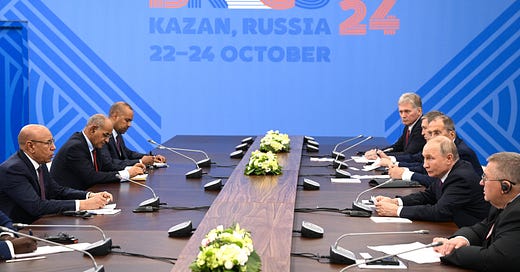An Empowered BRICS Struts its Stuff in Kazan*
Evidence of western decline in sway on display
Americans were focused on their presidential election. Meanwhile, evidence of US decline in global influence was being demonstrated by the presence in Russia of US friends who were in Moscow to attend the summit of the BRICS group. This event not only burnished the image of Russian President Vladimir Putin but fostered the notion that for far too long, the world has been subject to western domination and misuse of the status it acquired at the formation of post-1945 institutions such as the United Nations, the World Bank, the International Monetary Fund, etc.
A year ago, Putin had not been able to attend the BRICS summit in South Africa out of fear of an International Criminal Court warrant in connection with his Ukraine war. But here, he was shaking hands with Chinese President Xi Jinping, hugging Indian Prime Minister Narendra Modi, and being greeted by his “friend” President Recep Tayyip Erdoğan of Turkey. Meanwhile, Modi and Xi used the occasion to announce a border agreement which should take some of the tension out of their relationship and could be presented as showing the group value in helping relations between otherwise antagonistic neighbors. Whether it can do the same between new members Egypt and Ethiopia remains to be seen.
The group itself, it is claimed, would grow to represent the interests of the Global South and reduce the dominant role of the dollar in trade and financial transactions. In addition to China, India, South Africa, Russia, and Brazil, the group this year added Iran, Saudi Arabia, Egypt, Ethiopia and the UAE. About another 30 countries have apparently expressed interest in joining, including Malaysia, Thailand, Turkey, and Mexico. However, the process of joining is unclear, apparently needing a consensus of all, at least original, existing members. Brazil’s President Lula, who did not attend the summit, said he would oppose Venezuela joining. Brazil is concerned that too many members will reduce its influence. Other countries may take the view that joining will dilute the influence of Russia, India, and China. Russia hosted the first summit in 2009 and China is the base of its offshoot the New Development Bank.
Turkey is a member of NATO but not yet of BRICS. Erdogan clearly recognized the meeting as a chance to promote Turley’s position as a “middle power” He would also have understood Russia was emphasizing that it was an “Asian” nation by holding the meeting in Kazan which sits of the Volga, often deemed the border between Europe and Asia, and is the capital of the Russian republic of Tatarstan where half the population speaks Tatar, a Turkic language. Turkey’s influence in Turkic-speaking Central Asia is on the rise.
The statement at the end of the summit was, perhaps surprisingly, at best neutral from a Russian point of view on Ukraine, urging adherence to the principles of the UN Charter. But it came out strongly against western use of economic and financial sanctions which it deemed “illegal” and condemned the Israeli military offensive in Gaza, “which led to mass killings,” and also its attacks on Lebanon.
The group urged reform of the international financial architecture – hardly a radical proposal – and welcomed the use of member countries’ currencies in settlement of cross-border trade transactions. That has been taking place anyway, particularly with China’s promotion of the yuan. The process has been helped by US sanctions which may well prove counterproductive for the US as countries seek protection from sometimes all-embracing sanctions for dealing with countries such as Iran.
It is a fantasy that the BRICS group can create an alternative to the US dollar, but dollar holdings in reserves have been falling for several years anyway as countries have diversified into euros, gold, and now yuan. But interest in joining the group does reflect irritation even among friends of the west of some attitudes and policies. The tendency to tell other countries with different view, histories, interests, and traditions how to behave is deeply resented –a point recognized by European Council President Charles Michel who, in response to the Kazan attendance of allies, urged Brussels to stop “lecturing” and show more respect for developing countries. As for Russia and China, BRICS is a handy stick to beat the west.
*The site of the meeting was misidentified in an editing error. We apologize





The BRICS is an attempt to avoid international law and the global economic and political development according to the UN Charter and associated international declarations. This includes international law and financial crimes and including UN imposed sanctions. BRICS members are mainly authoritarian dictatorships which are resistant to democratic principles including peaceful dissent and opposition parties. Freedom of speech and media. Putin is and international war criminal. China has resumed its attempt at Asian hegemony and domination reminiscent of the Ching Dynasty. Very strange that China still requires it's loan repayment s from developing nations in USD s at exorbitant secret interest rates.
Kazan not Moscow